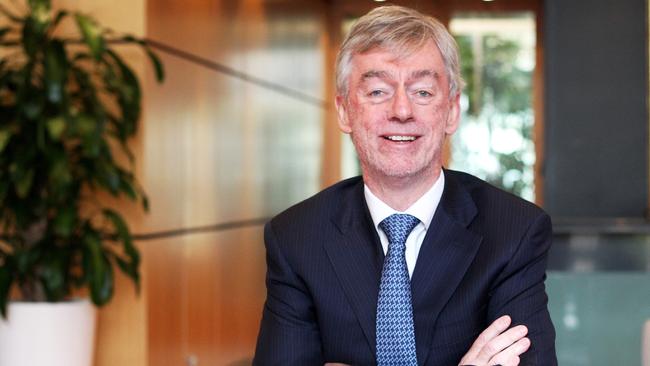Regulation slows loans, says Westpac bank chief Lindsay Maxsted
The Westpac chairman has warned that rising banking regulation is tightening credit and causing the pace of lending to slow.

Westpac chairman Lindsay Maxsted has warned that a rising tide of banking regulation, including excessive restrictions on new loans in the wake of the royal commission, is tightening credit and causing the pace of lending to homeowners and businesses to slow.
After The Australian yesterday revealed Josh Frydenberg’s call for the banks to reignite “affordable and timely’’ lending in the wake of the property market’s worst year since the global financial crisis, Mr Maxsted defended Westpac against criticism that it wasn’t lending at the same rate it had in the past.
He said Westpac’s books were “open’’ but there were limitations on demands from borrowers as people and companies currently had lower appetites for lending.
Property prices fell 8.9 per cent in Sydney and 7 per cent in Melbourne last year, prompting the Treasurer to sound the alarm on the drying up of credit and urge banks to keep lending.
Growth in lending is at the lowest rate in nearly 30 years.
Corporate leaders including former mining boss Hugh Morgan, property developer Bruce Dixon, Westpac director Peter Nash, South32 chairman David Crawford and financial services chief executive Ahmed Fahour yesterday echoed Mr Frydenberg’s comments. They warned that banks, risk-averse in the wake of the royal commission into the financial sector, could drag the nation’s economy to a halt.
However many, including Ansell chairman Glenn Barnes, defended the banks, saying a viable banking system was integral to the health of the economy.
Joining the cream of corporate Australia yesterday at the KPMG Couta boat races at the Victorian seaside town of Sorrento, Mr Maxsted told The Australian Westpac was lending but financial institutions such as his were being weighed down by current and looming regulation.
“Our books are open — they haven’t been closed, and they weren’t closed through 2018, and we are not credit-constrained in any way,’’ he said.
Mr Maxsted said demands by the Australian Securities & Investments Commission and the Australian Prudential Regulation Authority were slowing the pace of lending.
Banks such as Westpac were taking longer to approve loans that otherwise might have been struck more quickly in the past.
“Obviously the biggest change of course has been responsible lending, the push through ASIC and APRA on responsible lending, and then that’s picked up by Hayne through the royal commission,” Mr Maxsted said.
“And that’s putting greater demand, and our processes are slowing down because we are having to do more investigation, more checking — but that doesn’t mean our appetite is going down.’’
He warned that the impact could be especially harsh on young families looking to buy their first home, which would have a flow-on impact on the national economy.
“Young people … just starting out don’t have the deposit that they otherwise would and, in a credit sense, we might look at them and say ‘Yes, you are a good credit risk and we might lend to you’ but if responsible lending is taking them out of the market, then that’s a bad thing.”
Mr Maxsted said he was “pretty upbeat still” about the economy. “The levels of employment, unemployment, interest rates where they are, GDP growth … all that is positive,” he said. “We don’t need as a result of the Hayne recommendations or otherwise to go hard on responsible lending if it gives rise to poor decision-making on lending capacity.’’
Mr Morgan said the banks “are gun-shy, I think, as they wait for the (royal commission) report to come out (and) how demanding will it be”.
He said Mr Frydenberg’s comments might be seen as being aimed at the royal commission and its head, former High Court judge Kenneth Hayne.
“And I guess if I were to put a kind interpretation on it, Josh is not just speaking to the banks but speaking to the royal commission and sending messages to all sorts of people,” he said. “Don’t make it too tough, for heaven’s sake, or the whole place stops.’’
Australian Agricultural Co and Nufarm chairman Donald McGauchie said Mr Frydenberg was correct to encourage banks to continue to pour credit into the system and that a return to the “bad old days’’ of lending was not desirable.
He was already seeing tighter lending hurting businesses and individual lenders.
“I would remember the days when you actually had to prove to the bank you didn’t need the money before you got it,” he said.
“I’m old enough to remember that, and we have gone now from a situation where money has been easiest to get, to responsibility being piled back on to the banks rather than borrowers.”
Former KPMG chairman Mr Nash said credit and lending were the lifeblood of the economy, and it was crucial banks continued to lend in a timely and affordable manner.
“I think they want to lend at the moment but quite rightly are being very cautious in light of the regulatory focus, the public scrutiny that is on them at the moment,” Mr Nash said.
“An inadvertent side-effect of that is a tightening of lending conditions, which I think is potentially very problematic for the Australian economy.”
Former healthcare chief executive and pubs developer Mr Dixon said: “I think Josh is absolutely right. They have to open up the credit — it is getting very tight at the moment and I think to get any growth into the economy, they need to lend.
“You can understand why they are gun-shy but they have got to start lending.”





To join the conversation, please log in. Don't have an account? Register
Join the conversation, you are commenting as Logout